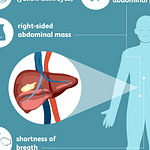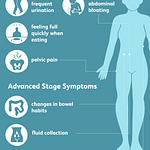Getting one or more of the following signs does not necessarily mean you have cancer. Many of these effects are actually more likely to be triggered by other conditions too. It’s indeed vital to have them tested by a doctor if you have any of these symptoms so that the cause can be identified and handled as soon as possible.

Table of Contents
Signs and Symptoms
Liver cancer signs and symptoms typically do not occur until the later stages of the disease, but occasionally they can appear earlier. Your cancer may be detected sooner if you go to your doctor when you first have symptoms when care is more likely to be beneficial. Some of the signs of liver cancer that are more common are:
- Loss of weight (without doing it)
- Appetite Loss
- Feeling very full after consuming a small meal
- Dizziness or vomiting
- A swollen liver felt on the right side as fullness under the ribs
- An enlarged spleen felt on the left side as fullness under the ribs
- Abdominal (belly) pain or around the right shoulder blade
- Swelling in the abdomen (belly) or fluid build-up
- Itching
- Yellowing (jaundice) of the skin and eyes
Fever, swollen veins on the abdomen that can be seen through the skin, and abnormal swelling or bleeding can be other signs.
Some high-risk causes
People with chronic hepatitis or cirrhosis may feel worse than normal or may just have changes in the results of laboratory tests, such as tests for liver function or levels of alpha-fetoprotein (AFP). Some tumors of the liver develop hormones that function on organs other than the liver. It is probable that these hormones cause:
- High levels of calcium in the blood (hypercalcemia), which may contribute to nausea, confusion, constipation, weakness, or problems with the muscles
- Low blood sugar (hypoglycemia), which can lead to tiredness or fainting
- Breast enlargement (gynecomastia) and/or testicle shrinkage in males
- Red blood cell levels (erythrocytosis) are high and can cause someone to appear red and flushed.
- Levels of high cholesterol
Diagnosis
Early on, liver cancer is often difficult to detect because signs and symptoms often do not occur until it is in its later stages. On a physical test, small liver tumors are difficult to identify since the right rib cage protects much of the liver. It could already be very big by the time a tumor can be felt.
There are no commonly recommended screening tests for liver cancer in individuals at average risk at this time. Screening involves checking for cancer in people who have no cancer signs or history. But for certain people at higher risk, checking may be recommended.
Checking high-risk people for liver cancer
Patients of long-standing cirrhosis (scar tissue formation from liver damage) might develop liver cancer. If a patient with cirrhosis gets worse for no apparent cause, physicians can do tests to check for liver cancer.
But searching for high levels of AFP isn’t a perfect liver cancer test process. Many early liver cancer patients have normal levels of AFP. Some forms of cancer, as well as certain non-cancerous conditions, can also raise AFP levels.
Tests with Imaging

To produce photographs of the inside of the body, imaging experiments use x-rays, magnetic fields, or sound waves. Imaging tests can be conducted both before and after a liver cancer diagnosis for a variety of reasons, including:
- To better classify suspected areas of cancer,
- A biopsy needle is guided into a suspicious area to help a doctor take a sample.
- To find out how far cancer could have spread
- Help direct the liver with such treatments
- To help decide what therapy works
The cancer specialists at Cancer Healer Center, the best liver cancer hospital in India, can help you cope up with the disease. All you need is a positive mind frame and an eagerness to cooperate with the doctors. And the good news is that cancer is curable. Talk to an expert now.
Also Read:
Monster Musume Season 2 – Release Date
Showbox Alternative – The Best Sites

Be First to Comment